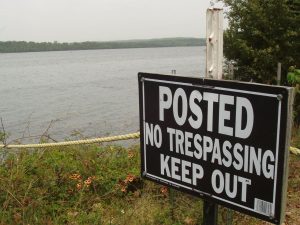Charlotte Criminal Lawyer Brad Smith answers the question: “Do I need to hire an attorney if I have been falsely accused?”
One of the quintessential components of the American dream is owning your own property. No matter how big or small that parcel of land may be, knowing it is yours can give owners a sense of comfort and pride. However, as any criminal defense attorney may attest, nothing can turn that sense of pride into concern quicker than a situation involving illegal trespassing.
 Like many states, North Carolina has created its own set of definitions and laws surrounding trespassing. Like other state statutes, North Carolina generally defines trespassing as having an element of intent (e.g. the intent to enter or stay on a piece of property without permission).
Like many states, North Carolina has created its own set of definitions and laws surrounding trespassing. Like other state statutes, North Carolina generally defines trespassing as having an element of intent (e.g. the intent to enter or stay on a piece of property without permission).
In a criminal trespassing case, the criminal defense attorney will work with you to build a case that shows there was no intent to be on the property. What the attorney will be quick to point out, however, is that in many cases the simple presence of a “No Trespassing” sign can be an incriminating piece of evidence against your case. Therefore, it is imperative that you and your criminal defense attorney work diligently to structure a solid case, as any indication of intent can be hard to fight against.
In North Carolina, the law regarding trespassing is split into two different classifications: first and second degree trespassing. The definition and penalties of each type of trespassing will vary depending on the circumstances surrounding the individual case. While regular communication with your criminal defense attorney is the preferred course of action, this article aims to provide a general overview of North Carolina’s criminal trespassing laws.
Defining Trespassing in North Carolina
Under a first degree trespassing charge in North Carolina, trespassing is defined as entering and/or staying on a property without permission. More specifically, the property is defined as either someone else’s enclosed/secured property that clearly indicates intent to keep out intruders. Examples include a fenced yard or a locked building.
Second degree trespass is a charge that typically follows a first degree offense. For example, after an intruder has been notified by the owner to leave, or when there is notice telling intruders not to enter (e.g. a “No Trespassing” sign).
Trespassing Charges in North Carolina
A charge of first degree trespassing is typically a Class 2 misdemeanor, but certain aggravating factors can exacerbate this charge. For example, trespassing on public utility providers’ property, and/or with the intent to disrupt the normal operations on the premises, can extend the charge to a Class H felony. It becomes a Class I felony if the intruder returns after being removed.
Second degree trespassing charges start at a Class 3 misdemeanor, but the severity of the charges can vary due to similar factors as first degree trespassing charges.
When to Call an Attorney
As you can see, the element of intent is a critical determining factor in any criminal trespassing case in North Carolina. Therefore, working with qualified and experienced criminal defense attorneys is crucial for building a solid defense case. For years, the attorneys at Arnold & Smith, PLLC have been working with residents in Charlotte and North Carolina to do just that. Please contact us today to get a phone, video or in-person consultation by calling at (704) 370-2828 to speak with our detail-oriented and well-versed lawyers with offices in Charlotte, Lake Norman, and Monroe, please contact Arnold & Smith, PLLC today or find additional resources here.
The criminal defense attorneys at Arnold & Smith, PLLC make it their mission to zealously defend their clients on a wide range of criminal matters at both the state and federal levels. These matters may include any charge from traffic offenses; DWI/DUI; drug charges (from simple possession to possession with intent to distribute and trafficking); gun permit denials; weapons offenses; and property crimes (larceny, breaking and entering, robbery, fraud, embezzlement, white collar offenses); to sexually related offenses (indecent exposure; sexual assault, crimes against nature, removal from sex offender registry); and violent crimes (domestic violence; assault; manslaughter; homicide, murder). Other legal issues that Arnold & Smith, PLLC criminal clients may be facing include restraining orders, restraining order and probation violations, expungements; appeals; and immigration issues related to criminal charges. Our criminal defense attorneys are passionate about ensuring that individuals empower themselves by being informed about their constitutional rights, and stand at the ready to fight in the defense of those facing criminal charges.
Source:
https://statelaws.findlaw.com/north-carolina-law/north-carolina-criminal-trespass-laws.html
Image Credit:
https://www.freeimages.com/photo/no-trespassing-1193832
See Our Related Video from our YouTube channel:
https://www.youtube.com/user/ArnoldSmithPLLC/videos
See Our Related Blog Posts:
What is Domestic Criminal Trespass in North Carolina?
 Charlotte Criminal Lawyer Blog
Charlotte Criminal Lawyer Blog


